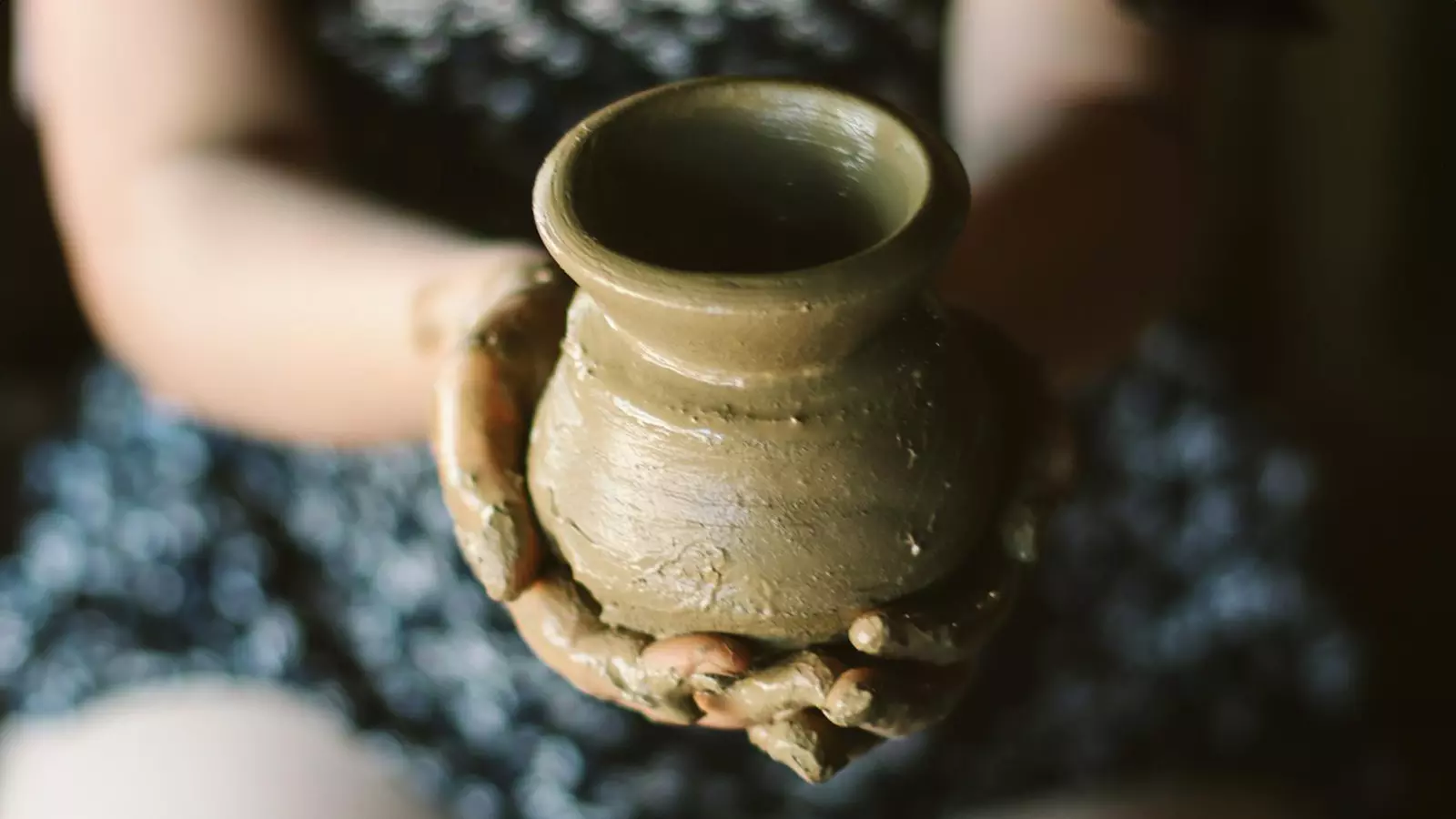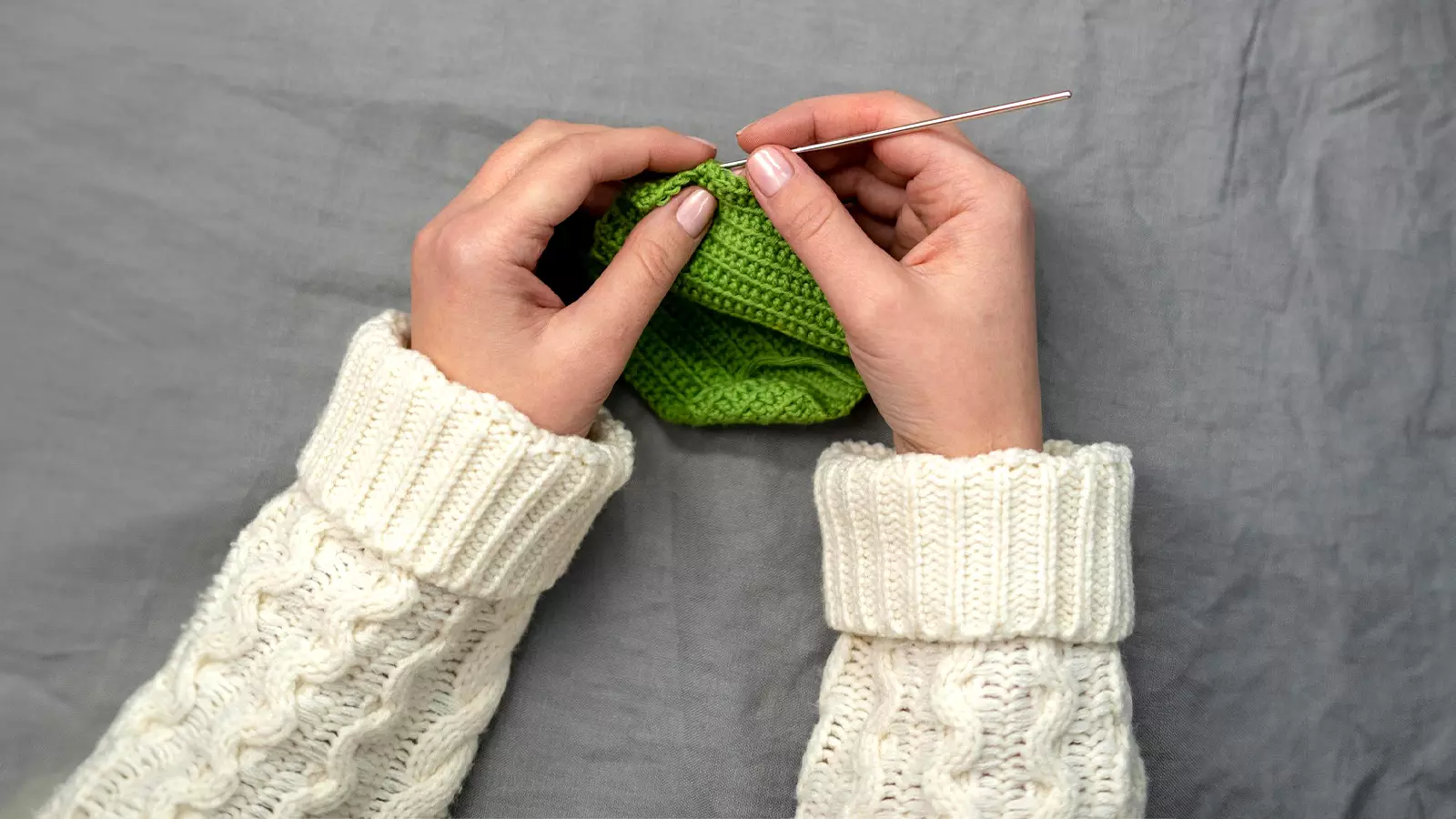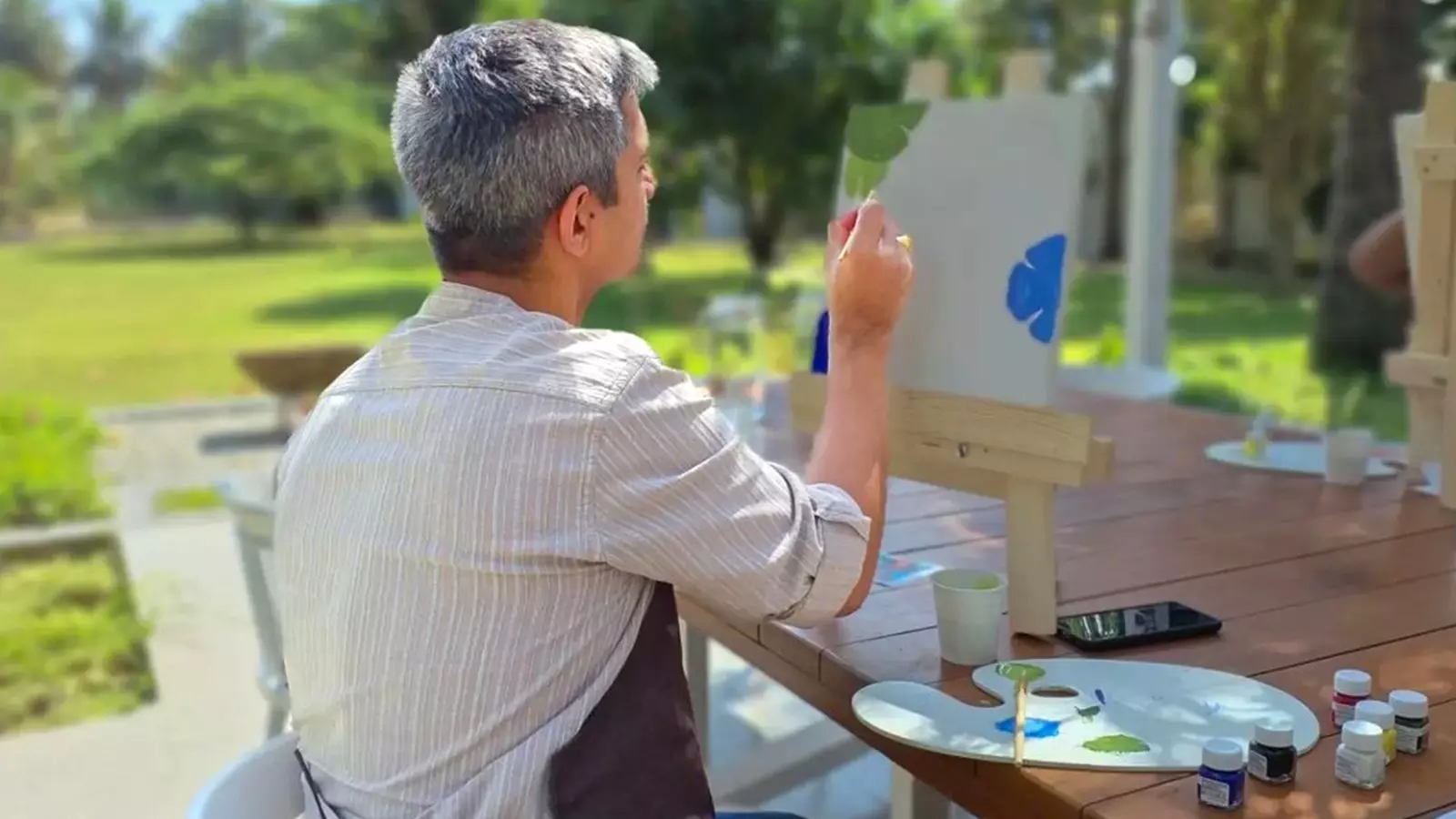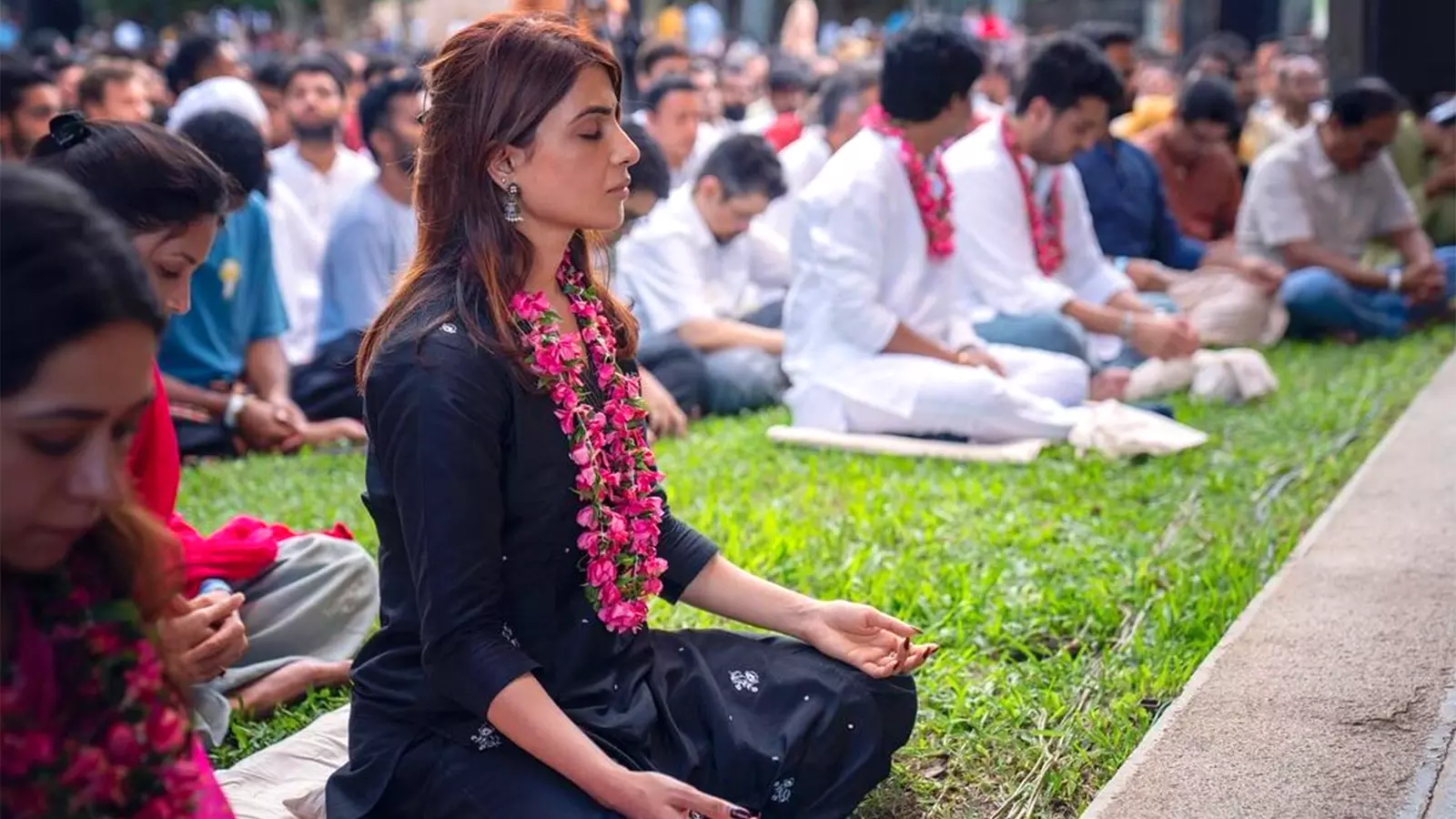
- Home
- India
- World
- Premium
- THE FEDERAL SPECIAL
- Analysis
- States
- Perspective
- Videos
- Sports
- Education
- Entertainment
- Elections
- Features
- Health
- Business
- Series
- In memoriam: Sheikh Mujibur Rahman
- Bishnoi's Men
- NEET TANGLE
- Economy Series
- Earth Day
- Kashmir’s Frozen Turbulence
- India@75
- The legend of Ramjanmabhoomi
- Liberalisation@30
- How to tame a dragon
- Celebrating biodiversity
- Farm Matters
- 50 days of solitude
- Bringing Migrants Home
- Budget 2020
- Jharkhand Votes
- The Federal Investigates
- The Federal Impact
- Vanishing Sand
- Gandhi @ 150
- Andhra Today
- Field report
- Operation Gulmarg
- Pandemic @1 Mn in India
- The Federal Year-End
- The Zero Year
- Science
- Brand studio
- Newsletter
- Elections 2024
- Events
Knitting away the chaos: How slow hobbies are weaning away stress in a fast-paced world

In the relentless pursuit of productivity and success, society often overlooks the importance of slowing down and savouring the present moment, especially when smartphones and social media offer easy distractions. However, the rising popularity of slow hobbies in 2024 reflects a growing recognition of the value of embracing a more deliberate, mindful approach to life. Slow living is not just...
In the relentless pursuit of productivity and success, society often overlooks the importance of slowing down and savouring the present moment, especially when smartphones and social media offer easy distractions. However, the rising popularity of slow hobbies in 2024 reflects a growing recognition of the value of embracing a more deliberate, mindful approach to life. Slow living is not just a trend; it's a philosophy that emphasizes the significance of finding balance, prioritizing well-being, and cultivating meaningful connections with oneself and others.
"I was neck-deep in stress when a friend introduced me to knitting. I remember thinking, 'Yeah right, like this will help.' At first, knitting was so difficult I felt like I was just tangling myself up in more stress! I was like, 'Why did I even start this? It's more stressful!' But then, once I got the hang of it, I realised she was right. It really does help me unwind. Now, I can say knitting my way out of stress is a hobby that actually works," said filmmaker Veena Narasasetty.

Amidst her demanding schedule and pregnancy, Padukone discovered solace and serenity in the art of pottery. Photo: For representation
Some believe slow hobbies are being used as tools to wean people away from phone and tech addiction.
“They say slow living is a fad. I disagree that turning to slow hobbies like pottery and painting is merely about keeping up with a trend. While the popularity of these activities has increased, many people are genuinely seeking ways to disconnect from their mobile tech devices and find meaningful downtime,” said Aditya Mendonca, founder South Fire Sport.
Deepika Padukone, renowned Bollywood actress and advocate for mental health awareness, has been a vocal proponent of slow living. Amidst her demanding schedule and pregnancy, Padukone discovered solace and serenity in the art of pottery. Through her public advocacy and personal experiences, she has recently highlighted the therapeutic benefits of working with clay as a means of finding inner peace and grounding in the midst of life's chaos. Padukone's journey serves as a powerful reminder that slow hobbies offer more than just a temporary escape; they provide a sanctuary for the soul, allowing individuals to reconnect with themselves on a deeper level. Veteran actress Kajol has also become a prominent advocate of the art of crocheting and knitting. Through her social media platforms, she shares her passion for slow hobbies, inspiring her followers to embrace the therapeutic benefits of needlework and creativity.

Kajol sleeps in a blanket she knitted herself. Photo: Kajol's Instagram account
Similarly, Samantha, a beloved South Indian actress, has embraced slow living through her dedication to yoga, meditation, travelling, reading and gardening. Samantha's journey towards mindfulness and self-discovery as she openly showcases it on social media, is reflected in her commitment to nurturing life through gardening and other activities. Advocacy of slow hobbies and a slow life by all these celebrities, underscores the transformative power of mindfulness and intentional living in fostering personal growth and well-being.

Veteran actress Kajol has also become a prominent advocate of the art of crocheting and knitting.
"Embracing a slow life for me involves engaging in activities that promote mindfulness and relaxation. I spend time with a good book, either at home or in one of the many thriving bookstores in the city. I enjoy leisurely walks in places like Sankey Tank or Cubbon Park to connect with nature and clear my mind. I explore Bangalore or any city I'm traveling through city walks to discover and appreciate the local culture and history. I take the time to brew coffee using a Moka pot, savoring the process and the rich flavours. I also head to the beach for a peaceful retreat and to enjoy the calming sounds of the waves,” said Adithya.
Slow hobbies encompass a wide range of activities, from painting and journaling to birdwatching and baking bread from scratch. What unites these diverse pursuits is their emphasis on mindfulness, intentionality, and presence. Unlike the instant gratification of scrolling through social media or binge-watching television shows, slow hobbies encourage individuals to slow down, engage their senses, and fully immerse themselves in the present moment.
Engaging in slow hobbies offers numerous benefits that contribute to overall well-being and a higher quality of life. These activities, such as gardening and painting, have a calming effect that reduce stress and anxiety levels. Participating in slow hobbies can improve mental health by fostering a sense of accomplishment and boosting self-esteem. The repetitive and meditative nature of these activities helps clear the mind and improve focus. Slow hobbies encourage mindfulness and presence, enhancing self-awareness and reducing the tendency to dwell on past worries or future anxieties. They also involve creativity and self-expression, which can be fulfilling and therapeutic, allowing individuals to explore their creativity and express emotions constructively.

Participating in slow hobbies can improve mental health by fostering a sense of accomplishment and boosting self-esteem.
Engaging in slow hobbies often involves learning new skills and improving existing ones, keeping the mind active and sharp while providing a sense of purpose and growth. Some slow hobbies, like gardening or yoga, involve physical activity, improving physical health by enhancing flexibility, strength, and overall fitness without the intensity of high-impact exercise. Many slow hobbies can be enjoyed in groups or communities, offering opportunities for social interaction and connection, creating a sense of belonging and reducing feelings of loneliness. Hobbies like growing a terrace garden, cooking from scratch, or engaging in DIY projects can promote a more sustainable lifestyle, often involving the wise use of natural resources and fostering greater awareness of environmental issues. Integrating slow hobbies into one’s routine helps create a more balanced life, allowing individuals to allocate time for relaxation and enjoyment amidst busy schedules, leading to a more harmonious and fulfilling life.
Many companies are emerging, aiming to provide services that cater to a slow life, emphasizing mindfulness and relaxation. These businesses offer everything from sustainable lifestyle goods to wellness experiences designed to help people unwind and reconnect with themselves.
“The Slow Life was born out of a personal realisation and a broader societal need. In today’s fast-paced world, many of us are constantly on the go, juggling multiple responsibilities and battling the stresses of modern life. I found myself longing for moments of genuine connection, tranquility, and joy—moments where I could fully engage with my surroundings and the people around me without the constant rush. Me and my business partner Purvi Kamaliya started The Slow Life together as Art, wellness, culinary experiences, culture, and sustainability have always been close to our heart,” said Nivedha Selvaraj, founder and experience curator at The Slow Life.
“I think it’s a wonderful and encouraging trend that more people are opting for slow hobbies these days. This shift signifies a growing awareness of the need for balance and mindfulness in our lives. Engaging in slow hobbies—whether it’s gardening, knitting, journaling, painting, cooking, or even leisurely reading—allows individuals to disconnect from the constant barrage of information and technology that often dominates our daily routines,” Nivedha added.
These elements are not just hobbies or interests; they are vital aspects of a balanced and fulfilling life. They remind us of the beauty in simplicity, the richness in slowing down, and the importance of nurturing both our inner selves and the world around us.
At its core, slow living is about reclaiming control over our time and attention, resisting the constant barrage of distractions and demands that often characterize modern life. By intentionally allocating time for slow hobbies, individuals can cultivate a greater sense of balance, fulfillment, and connection in their lives. Whether it's spending an afternoon in the garden, savoring the process of creating a piece of art, or simply enjoying a quiet moment of reflection, slow hobbies offer a reprieve from the hustle and bustle of daily life.
Moreover, slow hobbies have been shown to have numerous health benefits, both physical and psychological. Engaging in creative activities, such as painting or crafting, can reduce stress levels, improve mood, and enhance cognitive function. Similarly, spending time in nature through activities like gardening or birdwatching has been linked to lower blood pressure, reduced anxiety, and increased feelings of happiness and well-being. By prioritizing slow hobbies, individuals can prioritize their mental and emotional health, fostering resilience and vitality in the face of life's challenges.

What unites all slow hobbies is their emphasis on mindfulness, intentionality, and presence.
In addition to their personal benefits, slow hobbies also have the power to foster community and connection. Whether it's joining a knitting circle, attending a painting class, or participating in a community gardening project, slow hobbies provide opportunities for individuals to come together, share experiences, and form meaningful relationships. In a society that often prioritizes individualism and competition, these communal activities offer a welcome antidote, fostering a sense of belonging and mutual support among participants.
As we navigate the complexities of the modern world, the importance of embracing slow living and prioritizing slow hobbies cannot be overstated. In a culture that glorifies busyness and productivity, it's easy to lose sight of what truly matters: our health, our relationships, and our sense of purpose. Slow hobbies offer a pathway to reconnection, enabling individuals to cultivate presence, meaning, and joy in their lives. Whether it's through pottery, gardening, baking, calligraphy or needlework, the journey towards slow living begins with a single step – a commitment to slowing down, savouring the moment, and embracing the beauty of life's simple pleasures.
